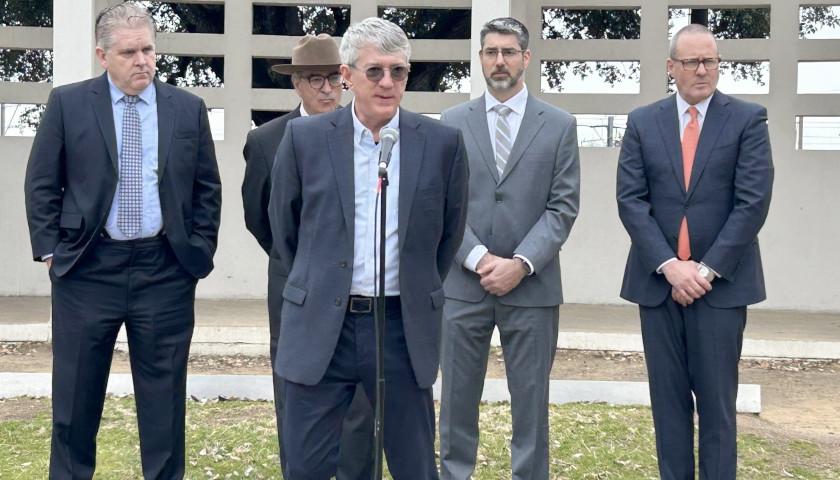Live from Music Row Thursday morning on The Tennessee Star Report with Michael Patrick Leahy – broadcast on Nashville’s Talk Radio 98.3 and 1510 WLAC weekdays from 5:00 a.m. to 8:00 a.m. – host Leahy welcomed the head of Professional Educators of Tennessee, J.C. Bowman, in the studio to comment upon the recent letter from the U.S. Department of Education regarding the missing implementation of assessment and accountability requirements.
Leahy: In the studio, the head of Professional Educators of Tennessee. J.C. Bowman. J.C., I have in my hands a letter dated September 27th of this year from the U.S. Department of Education to Penny Schwinn, our commissioner of education here.
Dear Commissioner Schwinn, I’m writing regarding the Tennessee Department of Education’s implementation of assessment and accountability requirements resulting from required actions identified by the Department of Education in our 2021 performance review, which was reported to you in November of 2021.
This looks like there’s trouble headed our way.
Bowman: Yes, there’s absolute trouble heading our way, and it could end up paying back, if you recall.
Leahy: Paying back who?
Bowman: The federal government.
Leahy: How much?
Bowman: It depends on how much they’re looking at …
Leahy: But they’re saying, hey, we sent you this review back in November. There are, like, 15 actions required.
I guess they’re suggesting you haven’t taken those actions, and therefore you’ve got to send us back a whole bunch of money. Is that what the Feds are telling us?
Bowman: Yeah. And they’re saying, or further action?
Leahy: When the federal government tells you or further action, this is what you might call a clue something bad might be headed our way.
Bowman: Listen to the ending of the letter, [it] says that in addition to the 2022 year, which is this year and 2023, no later than December 1st, 2022, the Tennessee Department of Education must provide documentation of the assessments that the TDOE would administer for the ’22-’23 school year.
Leahy: When you say assessments, is this like, the scores that the kids get?
Bowman: Yes.
Leahy: What is an assessment?
Bowman: Well, that’s the test that you take.
Leahy: The test the kids take. So I looked at the test numbers most recently reported, which came out this summer. They were not good. They were actually bad pretty much across the board. Slight increases from the worst ever during the pandemic, but still very bad across the state, it seemed to me.
Bowman: Yes. Well, in some areas, particularly more. But what we found is the schools that went back after the pandemic did better. So when you do that, Michael, your achievements are higher because you went back, but your gains are lower because you’re also being measured against the last year’s thing, where you were already in there doing better, so your gains aren’t as high. So when we celebrate gains, we’re all excited.
Leahy: Well, it’s a little bit like, you’ve gone from absolutely, totally terrible to just kind of terrible. And if you make that change in one year, you get accolades, which seems to me to be kind of ridiculous, because, sort of terrible is still pretty terrible.
Bowman: So there’s the whole gauntlet. But apparently, here’s where I think – I believe in transparency in government. I believe that we should see what’s going on.
We should be made aware of it and everything else. These things came out last year. I mean, in September 2021, the Feds sent a letter – a document, a report – saying you’ve got some problems.
Leahy: Yes, and that’s been out here since 2021.
Bowman: Since 2021.
Leahy: But I didn’t know about this. Did you know about it?
Bowman: No.
Leahy: Until this letter came out.
Bowman: And let’s get credit, I want to get credit to where credit is due: TC Weber, a blogger here in Nashville,
Leahy: I think we’ve had him on once on the show.
Bowman: You should have him back.
Leahy: He’s a lively guy.
Bowman: He came to Nashville as a guitarist and a musician, and he stayed, and he’s got a point of view. And he’s just more populist. And I don’t think it’s more ideology, but he definitely believes in transparency in government, and that’s the argument.
And then in November of 2021, they sent the other report. And what actions has our department taken since then? And then the whole year, last year, we’re all pushing this funding system for this, and you and I talked about it.
We’re going to end up having to raise taxes by implementing TISA. So now we got this. But that’s what sucked the air out of the room, rather than kind of going after these real critical issues and trying to fix it.
Leahy: So let me just step back and now remind our listeners why the Federal Department of Education, which I think should be abolished, why they get to tell the state of Tennessee what’s wrong.
Bowman: And that’s the million-dollar question. Here’s where we’re at. Either you got some real gross incompetence at the Tennessee Department of Education, in which case, if that’s the case, our governor needs to step in and he needs to explain this – not the commissioner, our governor does.
And then number two, and I go back to this, or if the department is overreaching, we ought to all join hands together and say, listen, Lamar Alexander, who is the principal author of ESSA, which is the funding mechanism …
Leahy: What is ESSA?
Bowman: Education, elementary, secondary. The thing that funds the money.
Leahy: The federal funding.
Bowman: It’s federal funding for our education dollars.
Leahy: And just a reminder that in an average school here in Tennessee, K-12 public education, about 50 percent of it comes from state, 40 percent from local, and 10 percent from the Feds. Now, in some places like Williamson County, you get a lot more local, and in other, poorer places, you get a lot less local.
Bowman: And that’s what the BEP does now. The Basic Education Program is the current system.
Leahy: It provides more funding to the poorer counties.
Bowman: Yeah, equity – that word that Josiah likes a lot. (Leahy laughs) But back to this, is that, where we’re at, is again – or we should start talking together, and I give Lamar credit where he’s correct. Lamar was out in front.
People can like Lamar Alexander or not, but he didn’t shy away from controversy and he stepped up to the issues. And the governor needs to come out and step up on this. But here’s the point.
We should say, tell the federal government that, listen, we disagree with you. We don’t think that special ed students need to be taking the regular assessment test.
Leahy: Is that one of the things they say?
Bowman: That’s one of the things in there.
Leahy: Okay, so now this is a warning shot, though, from the Feds to the state of Tennessee. What possibly could go wrong subsequent to this warning shot?
Bowman: Well, and here’s where I think that one of the things that came in, one of the documents that they sent was that we are supplanting money.
What that means is you’re taking dollars that the state normally uses and they’re spending on hiring, whatever the position is.
Leahy: Hold on, is this Fed money?
Bowman: Federal money.
Leahy: Okay, so that 10 percent, that’s going to the state, 12 percent.
Bowman: And the state takes a portion of it.
Leahy: But they’re saying, the Feds are saying you’re not spending that money the way you told us you were going to spend it.
Bowman: Basically that’s it.
Leahy: So they’re going to be upset about that.
Bowman: Oh, absolutely. And the one question that got me, it says right here in this math assessment, we’re supposed to test 8th-grade math students on the number three question. On the letter it says that that’s consistent with CDO’s approval of the ESEA consolidated state plan and you must submit a waiver request to extend the 8th-grade mathematics assessment exemption to reading language arts and lower. Basically, we just failed to file the exemption request.
Listen to today’s show highlights, including this interview:
– – –
Tune in weekdays from 5:00 – 8:00 a.m. to The Tennessee Star Report with Michael Patrick Leahy on Talk Radio 98.3 FM WLAC 1510. Listen online at iHeart Radio.




